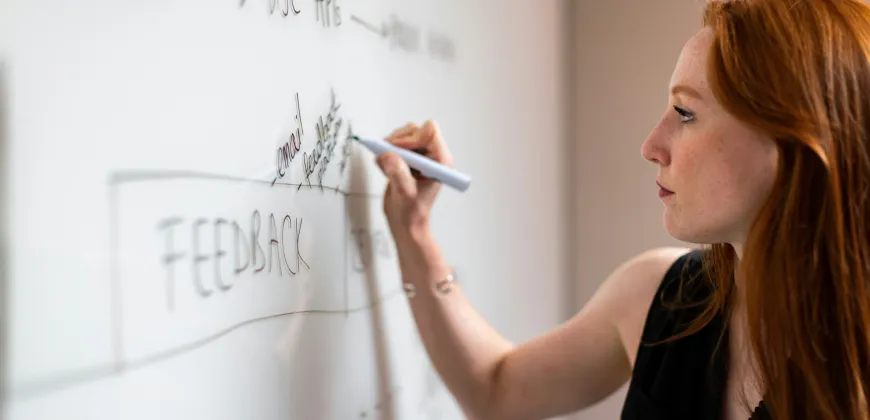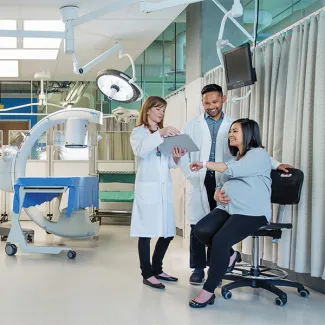Transforming health care education

In a conversation with Master of Health Leadership and Policy (MHLP) instructor Dr. Elisabeth Bailey, we talk about the challenges facing the health-care sector and the need for innovative leaders who can champion change management.
Tell us about your research.
I am in an educational leadership position at UBC, teaching at both the undergraduate and graduate levels. I am interested in how the experience of belonging and connectedness contributes to positive outcomes.
We’ve seen in clinical settings that when staff feel a sense of community and belonging, they have more confidence and are less prone to burnout.
This applies in educational environments as well, where strong connections in the classroom and clinical learning contexts result in deeper learning, encouraging students to challenge themselves, take risks and support each other.
What challenges have you seen in the health-care sector over the past few years?
The health-care system has been challenged for many years by an ongoing shortage of nurses and other health-care professionals.
That’s become more acute, with increasing rates of nurses leaving the profession, high patient loads, mandatory overtime and stress. The COVID-19 pandemic and the ongoing drug poisoning crisis also contribute to a difficult working environment and its effects on patient care. We need champions for change.
How can health-care professionals work for change and quality improvement?
The Clinical Education program – with its focus on curricular development, education and quality improvement – provides a strong foundation for change management.
Meaningful change starts with recognizing that while the health care system is very complicated, people are relational.
Keeping this front of mind matters if we want to work for change. We need people to stay within the health professions and support one another. That means caring for yourself and your colleagues. In the MHLP, we explore how to do this in very concrete terms.
In the class I teach on Clinical Nursing Education, for example, we talk about self and collective care as foundational to creating belonging and sense of purpose, and about the importance of building relationships with learners.
So we talk about developing a strong self-care practice, about strategies like individual and team-based rituals and grounding practices, and normalizing conversations about personal and professional well-being. All these things set the foundation for a learning environment that supports people to take risks and work for change. Learning about quality improvement is another way change happens. Quality improvement methods offer concrete processes that focus on breaking down a complex situation into very small pieces. Health-care professionals can use and apply these tools to improve the experience of practitioners and patients.
How does the MHLP prepare students to be clinical education leaders?
The MHLP gives professionals the skills to be leaders. On the clinical education side, we are talking about understanding adult learning needs, curricular development and assessment. The leadership piece in the clinical education courses and the business courses is very important, encompassing effective communication, strategies for leading teams and change management.
This is an interdisciplinary program that brings together nurses, social workers, occupational therapists, physicians and others working in the health care sector.
We look at health-care system issues together, and there are real strengths in learning from those who are outside of your discipline. This also mirrors health-care settings, where leaders need to be able to work effectively with people from a wide variety of backgrounds. About half of the curriculum is made up of business and leadership courses, where there is a complementary emphasis on change management. It’s powerful and practical. So the change management tools, the emphasis on communication and leadership, the focus on strategic thinking – all of those combined with students’ own expertise and learning from others’ experiences within the health-care system prepares students to be effective leaders.
What excites you most about this master’s degree?
It’s inspiring to work with students who are going to be leaders in health care, education leaders within health authorities and leaders within our systems. They are so committed to advocacy and positive change.
I feel genuinely hopeful about our future and the shifts that are possible because of the graduates of our program.
What are some of the career paths MHLP graduates take?
Many are taking on leadership roles within BC’s health authorities or in health care settings. Many are shaping policies and procedures that have a significant day-to-day impact on professional practice. A lot of our graduates transition into educational leadership roles, whether teaching in health professional programs or as a faculty member in a post-secondary institution. There are many paths that lead out from the MHLP in Clinical Education.
What do you find most rewarding about being part of the Clinical Education program?
I love teaching in this program because of how action-oriented the students are. They come into the program because they want to work for change and to gain the knowledge and skills to effectively transform the health-care system for the better. Many students continue to work part time while doing the MHLP and it’s so exciting to have conversations with them about how their learning is impacting their work.
There’s no gap between theory and practice: everything they are learning is making a difference, right now. The conversations we are having in class are directly impacting – for the better! – the experience of students, nurses and health care providers.






